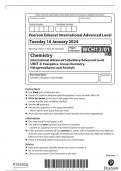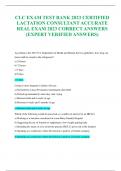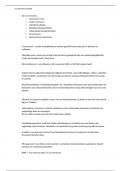Exam (elaborations)
Pearson Edexcel A-Level Chemistry Advanced Subsidiary/Advanced Level UNIT 2: Energetics, Group Chemistry, Halogenoalkanes and Alcohols January 2024 Authentic Marking Scheme Attached
- Module
- A-level Chemistry
- Institution
- A-level Chemistry
Pearson Edexcel A-Level Chemistry Advanced Subsidiary/Advanced Level UNIT 2: Energetics, Group Chemistry, Halogenoalkanes and Alcohols January 2024 Authentic Marking Scheme Attached
[Show more]





